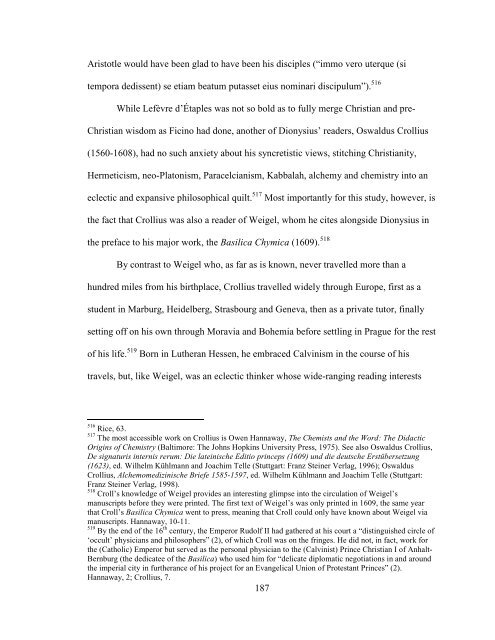the mystical theology of valentin weigel - DataSpace at Princeton ...
the mystical theology of valentin weigel - DataSpace at Princeton ...
the mystical theology of valentin weigel - DataSpace at Princeton ...
You also want an ePaper? Increase the reach of your titles
YUMPU automatically turns print PDFs into web optimized ePapers that Google loves.
Aristotle would have been glad to have been his disciples (“immo vero uterque (si<br />
tempora dedissent) se etiam be<strong>at</strong>um putasset eius nominari discipulum”). 516<br />
While Lefèvre d’Étaples was not so bold as to fully merge Christian and pre-<br />
Christian wisdom as Ficino had done, ano<strong>the</strong>r <strong>of</strong> Dionysius’ readers, Oswaldus Crollius<br />
(1560-1608), had no such anxiety about his syncretistic views, stitching Christianity,<br />
Hermeticism, neo-Pl<strong>at</strong>onism, Paracelcianism, Kabbalah, alchemy and chemistry into an<br />
eclectic and expansive philosophical quilt. 517 Most importantly for this study, however, is<br />
<strong>the</strong> fact th<strong>at</strong> Crollius was also a reader <strong>of</strong> Weigel, whom he cites alongside Dionysius in<br />
<strong>the</strong> preface to his major work, <strong>the</strong> Basilica Chymica (1609). 518<br />
By contrast to Weigel who, as far as is known, never travelled more than a<br />
hundred miles from his birthplace, Crollius travelled widely through Europe, first as a<br />
student in Marburg, Heidelberg, Strasbourg and Geneva, <strong>the</strong>n as a priv<strong>at</strong>e tutor, finally<br />
setting <strong>of</strong>f on his own through Moravia and Bohemia before settling in Prague for <strong>the</strong> rest<br />
<strong>of</strong> his life. 519 Born in Lu<strong>the</strong>ran Hessen, he embraced Calvinism in <strong>the</strong> course <strong>of</strong> his<br />
travels, but, like Weigel, was an eclectic thinker whose wide-ranging reading interests<br />
516 Rice, 63.<br />
517 The most accessible work on Crollius is Owen Hannaway, The Chemists and <strong>the</strong> Word: The Didactic<br />
Origins <strong>of</strong> Chemistry (Baltimore: The Johns Hopkins University Press, 1975). See also Oswaldus Crollius,<br />
De sign<strong>at</strong>uris internis rerum: Die l<strong>at</strong>einische Editio princeps (1609) und die deutsche Erstübersetzung<br />
(1623), ed. Wilhelm Kühlmann and Joachim Telle (Stuttgart: Franz Steiner Verlag, 1996); Oswaldus<br />
Crollius, Alchemomedizinische Briefe 1585-1597, ed. Wilhelm Kühlmann and Joachim Telle (Stuttgart:<br />
Franz Steiner Verlag, 1998).<br />
518 Croll’s knowledge <strong>of</strong> Weigel provides an interesting glimpse into <strong>the</strong> circul<strong>at</strong>ion <strong>of</strong> Weigel’s<br />
manuscripts before <strong>the</strong>y were printed. The first text <strong>of</strong> Weigel’s was only printed in 1609, <strong>the</strong> same year<br />
th<strong>at</strong> Croll’s Basilica Chymica went to press, meaning th<strong>at</strong> Croll could only have known about Weigel via<br />
manuscripts. Hannaway, 10-11.<br />
519 By <strong>the</strong> end <strong>of</strong> <strong>the</strong> 16 th century, <strong>the</strong> Emperor Rudolf II had ga<strong>the</strong>red <strong>at</strong> his court a “distinguished circle <strong>of</strong><br />
‘occult’ physicians and philosophers” (2), <strong>of</strong> which Croll was on <strong>the</strong> fringes. He did not, in fact, work for<br />
<strong>the</strong> (C<strong>at</strong>holic) Emperor but served as <strong>the</strong> personal physician to <strong>the</strong> (Calvinist) Prince Christian I <strong>of</strong> Anhalt-<br />
Bernburg (<strong>the</strong> dedic<strong>at</strong>ee <strong>of</strong> <strong>the</strong> Basilica) who used him for “delic<strong>at</strong>e diplom<strong>at</strong>ic negoti<strong>at</strong>ions in and around<br />
<strong>the</strong> imperial city in fur<strong>the</strong>rance <strong>of</strong> his project for an Evangelical Union <strong>of</strong> Protestant Princes” (2).<br />
Hannaway, 2; Crollius, 7.<br />
187
















